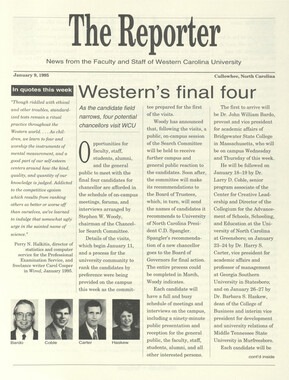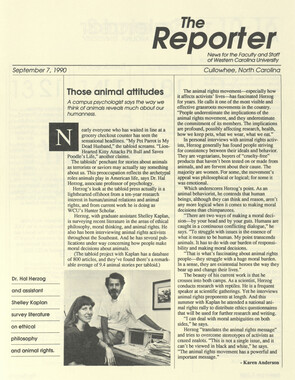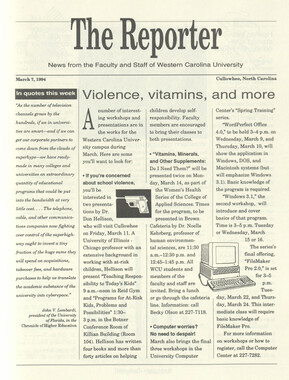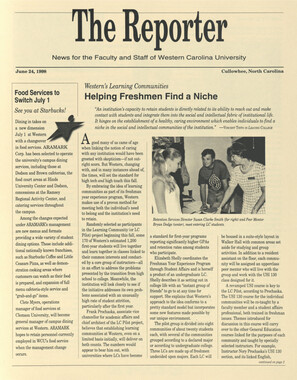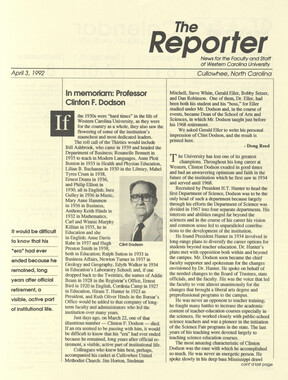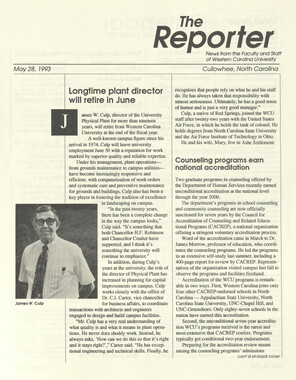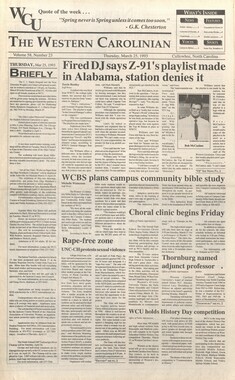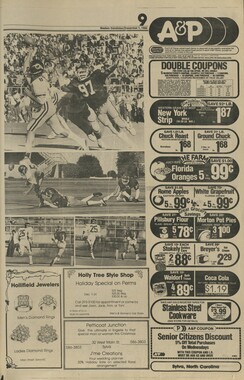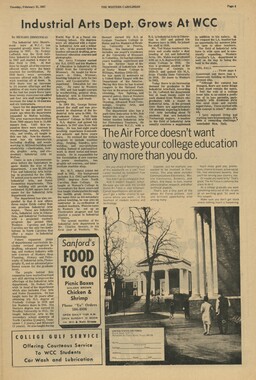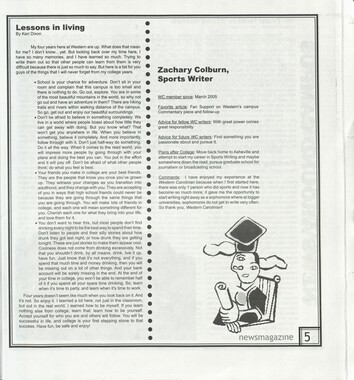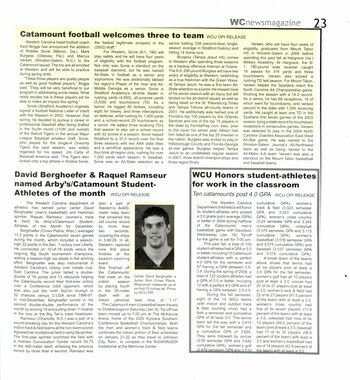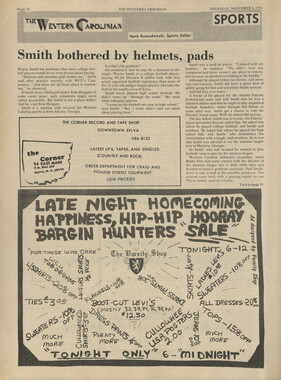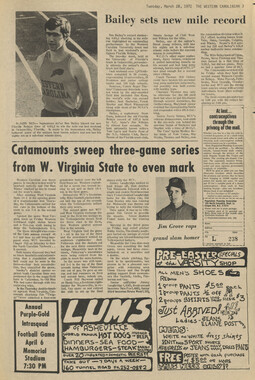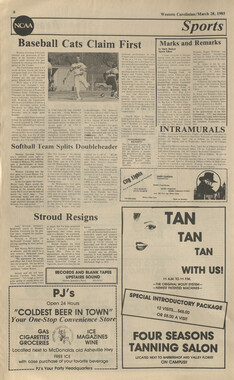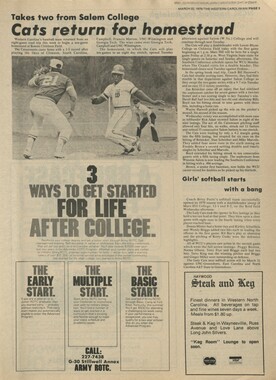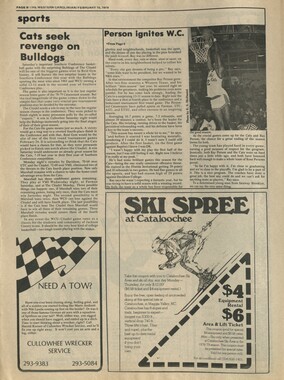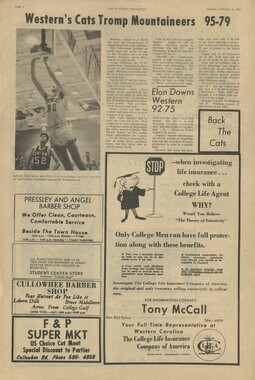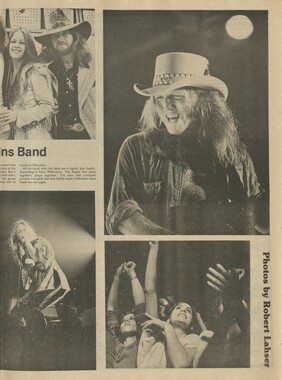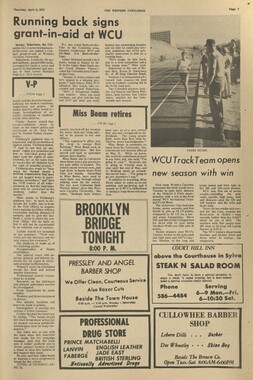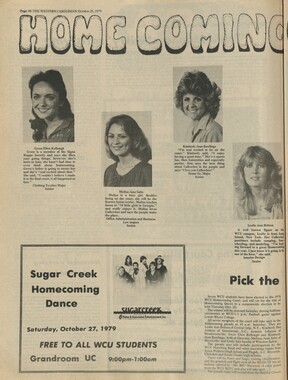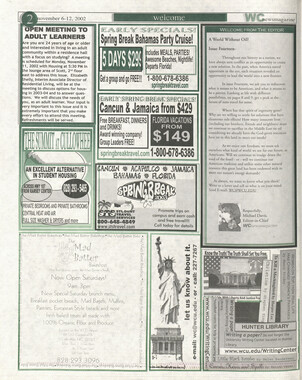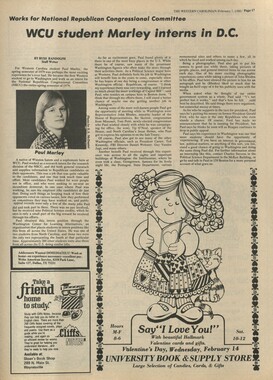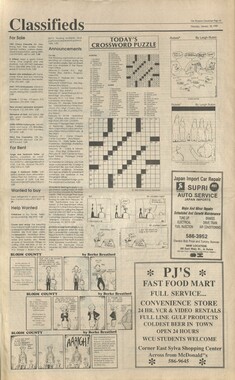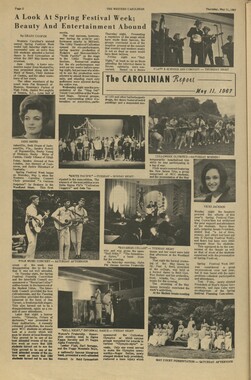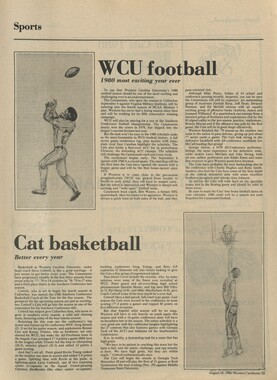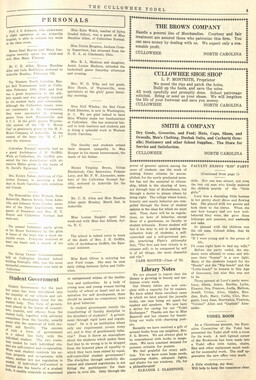Western Carolina University (20)
View all
- Canton Champion Fibre Company (2308)
- Cherokee Traditions (291)
- Civil War in Southern Appalachia (165)
- Craft Revival (1942)
- Great Smoky Mountains - A Park for America (2946)
- Highlights from Western Carolina University (430)
- Horace Kephart (941)
- Journeys Through Jackson (159)
- LGBTQIA+ Archive of Jackson County (85)
- Oral Histories of Western North Carolina (314)
- Picturing Appalachia (6873)
- Stories of Mountain Folk (413)
- Travel Western North Carolina (160)
- Western Carolina University Fine Art Museum Vitreograph Collection (129)
- Western Carolina University Herbarium (92)
- Western Carolina University: Making Memories (738)
- Western Carolina University Publications (2491)
- Western Carolina University Restricted Electronic Theses and Dissertations (146)
- Western North Carolina Regional Maps (71)
- World War II in Southern Appalachia (131)
University of North Carolina Asheville (6)
View all
- Allanstand Cottage Industries (62)
- Appalachian National Park Association (53)
- Bennett, Kelly, 1890-1974 (1463)
- Berry, Walter (76)
- Brasstown Carvers (40)
- Carver, George Washington, 1864?-1943 (26)
- Cathey, Joseph, 1803-1874 (1)
- Champion Fibre Company (233)
- Champion Paper and Fibre Company (297)
- Cherokee Indian Fair Association (16)
- Cherokee Language Program (22)
- Crowe, Amanda (40)
- Edmonston, Thomas Benton, 1842-1907 (7)
- Ensley, A. L. (Abraham Lincoln), 1865-1948 (275)
- Fromer, Irving Rhodes, 1913-1994 (70)
- George Butz (BFS 1907) (46)
- Goodrich, Frances Louisa (120)
- Grant, George Alexander, 1891-1964 (96)
- Heard, Marian Gladys (60)
- Kephart, Calvin, 1883-1969 (15)
- Kephart, Horace, 1862-1931 (313)
- Kephart, Laura, 1862-1954 (39)
- Laney, Gideon Thomas, 1889-1976 (439)
- Masa, George, 1881-1933 (61)
- McElhinney, William Julian, 1896-1953 (44)
- Niggli, Josephina, 1910-1983 (10)
- North Carolina Park Commission (105)
- Osborne, Kezia Stradley (9)
- Owens, Samuel Robert, 1918-1995 (11)
- Penland Weavers and Potters (36)
- Roberts, Vivienne (15)
- Roth, Albert, 1890-1974 (142)
- Schenck, Carl Alwin, 1868-1955 (1)
- Sherrill's Photography Studio (2565)
- Southern Highland Handicraft Guild (127)
- Southern Highlanders, Inc. (71)
- Stalcup, Jesse Bryson (46)
- Stearns, I. K. (213)
- Thompson, James Edward, 1880-1976 (226)
- United States. Indian Arts and Crafts Board (130)
- USFS (683)
- Vance, Zebulon Baird, 1830-1894 (1)
- Weaver, Zebulon, 1872-1948 (58)
- Western Carolina College (230)
- Western Carolina Teachers College (282)
- Western Carolina University (2008)
- Western Carolina University. Mountain Heritage Center (18)
- Whitman, Walt, 1819-1892 (10)
- Wilburn, Hiram Coleman, 1880-1967 (73)
- Williams, Isadora (3)
- Cain, Doreyl Ammons (0)
- Crittenden, Lorraine (0)
- Rhodes, Judy (0)
- Smith, Edward Clark (0)
- Appalachian Region, Southern (2569)
- Asheville (N.C.) (1923)
- Avery County (N.C.) (26)
- Blount County (Tenn.) (195)
- Buncombe County (N.C.) (1672)
- Cherokee County (N.C.) (283)
- Clay County (N.C.) (555)
- Graham County (N.C.) (236)
- Great Smoky Mountains National Park (N.C. and Tenn.) (519)
- Haywood County (N.C.) (3569)
- Henderson County (N.C.) (70)
- Jackson County (N.C.) (4912)
- Knox County (Tenn.) (35)
- Knoxville (Tenn.) (13)
- Lake Santeetlah (N.C.) (10)
- Macon County (N.C.) (420)
- Madison County (N.C.) (215)
- McDowell County (N.C.) (39)
- Mitchell County (N.C.) (132)
- Polk County (N.C.) (35)
- Qualla Boundary (982)
- Rutherford County (N.C.) (76)
- Swain County (N.C.) (2182)
- Transylvania County (N.C.) (270)
- Watauga County (N.C.) (12)
- Waynesville (N.C.) (86)
- Yancey County (N.C.) (72)
- Aerial Photographs (3)
- Aerial Views (60)
- Albums (books) (4)
- Articles (1)
- Artifacts (object Genre) (228)
- Bibliographies (1)
- Biography (general Genre) (2)
- Cards (information Artifacts) (38)
- Clippings (information Artifacts) (191)
- Copybooks (instructional Materials) (3)
- Crafts (art Genres) (622)
- Depictions (visual Works) (21)
- Design Drawings (1)
- Drawings (visual Works) (185)
- Envelopes (73)
- Exhibitions (events) (1)
- Facsimiles (reproductions) (1)
- Fiction (general Genre) (4)
- Financial Records (12)
- Fliers (printed Matter) (67)
- Glass Plate Negatives (381)
- Guidebooks (2)
- Internegatives (10)
- Interviews (815)
- Land Surveys (102)
- Letters (correspondence) (1013)
- Manuscripts (documents) (618)
- Maps (documents) (177)
- Memorandums (25)
- Minutes (administrative Records) (59)
- Negatives (photographs) (6090)
- Newsletters (1290)
- Newspapers (2)
- Notebooks (8)
- Occupation Currency (1)
- Paintings (visual Works) (1)
- Pen And Ink Drawings (1)
- Periodicals (193)
- Personal Narratives (10)
- Photographs (12976)
- Plans (maps) (1)
- Poetry (5)
- Portraits (4568)
- Postcards (329)
- Programs (documents) (181)
- Publications (documents) (2443)
- Questionnaires (65)
- Relief Prints (26)
- Sayings (literary Genre) (1)
- Scrapbooks (282)
- Sheet Music (2)
- Slides (photographs) (402)
- Songs (musical Compositions) (2)
- Sound Recordings (796)
- Specimens (92)
- Speeches (documents) (18)
- Tintypes (photographs) (8)
- Transcripts (322)
- Video Recordings (physical Artifacts) (23)
- Text Messages (0)
- A.L. Ensley Collection (275)
- Appalachian Industrial School Records (7)
- Appalachian National Park Association Records (336)
- Axley-Meroney Collection (2)
- Bayard Wootten Photograph Collection (20)
- Bethel Rural Community Organization Collection (7)
- Blumer Collection (5)
- C.W. Slagle Collection (20)
- Canton Area Historical Museum (2110)
- Carlos C. Campbell Collection (462)
- Cataloochee History Project (64)
- Cherokee Studies Collection (4)
- Daisy Dame Photograph Album (5)
- Daniel Boone VI Collection (1)
- Doris Ulmann Photograph Collection (112)
- Elizabeth H. Lasley Collection (1)
- Elizabeth Woolworth Szold Fleharty Collection (4)
- Frank Fry Collection (95)
- George Masa Collection (173)
- Gideon Laney Collection (452)
- Hazel Scarborough Collection (2)
- Hiram C. Wilburn Papers (28)
- Historic Photographs Collection (236)
- Horace Kephart Collection (861)
- Humbard Collection (33)
- Hunter and Weaver Families Collection (1)
- I. D. Blumenthal Collection (4)
- Isadora Williams Collection (4)
- Jesse Bryson Stalcup Collection (47)
- Jim Thompson Collection (224)
- John B. Battle Collection (7)
- John C. Campbell Folk School Records (80)
- John Parris Collection (6)
- Judaculla Rock project (2)
- Kelly Bennett Collection (1482)
- Love Family Papers (11)
- Major Wiley Parris Civil War Letters (3)
- Map Collection (12)
- McFee-Misemer Civil War Letters (34)
- Mountain Heritage Center Collection (4)
- Norburn - Robertson - Thomson Families Collection (44)
- Pauline Hood Collection (7)
- Pre-Guild Collection (2)
- Qualla Arts and Crafts Mutual Collection (12)
- R.A. Romanes Collection (681)
- Rosser H. Taylor Collection (1)
- Samuel Robert Owens Collection (94)
- Sara Madison Collection (144)
- Sherrill Studio Photo Collection (2558)
- Smoky Mountains Hiking Club Collection (616)
- Stories of Mountain Folk - Radio Programs (374)
- The Reporter, Western Carolina University (510)
- Venoy and Elizabeth Reed Collection (16)
- WCU Gender and Sexuality Oral History Project (32)
- WCU Mountain Heritage Center Oral Histories (25)
- WCU Oral History Collection - Mountain People, Mountain Lives (71)
- WCU Students Newspapers Collection (1923)
- Western North Carolina Tomorrow Black Oral History Project (69)
- William Williams Stringfield Collection (2)
- Zebulon Weaver Collection (109)
- African Americans (390)
- Appalachian Trail (35)
- Artisans (521)
- Cherokee art (84)
- Cherokee artists -- North Carolina (10)
- Cherokee language (21)
- Cherokee pottery (101)
- Cherokee women (208)
- Church buildings (189)
- Civilian Conservation Corps (U.S.) (111)
- College student newspapers and periodicals (2012)
- Dams (107)
- Dance (1023)
- Education (222)
- Floods (61)
- Folk music (1015)
- Forced removal, 1813-1903 (2)
- Forest conservation (220)
- Forests and forestry (1184)
- Gender nonconformity (4)
- Great Smoky Mountains National Park (N.C. and Tenn.) (181)
- Hunting (45)
- Landscape photography (25)
- Logging (119)
- Maps (83)
- Mines and mineral resources (8)
- North Carolina -- Maps (18)
- Paper industry (38)
- Postcards (255)
- Pottery (135)
- Railroad trains (72)
- Rural electrification -- North Carolina, Western (3)
- School integration -- Southern States (2)
- Segregation -- North Carolina, Western (5)
- Slavery (5)
- Sports (452)
- Storytelling (243)
- Waterfalls -- Great Smoky Mountains (N.C. and Tenn.) (66)
- Weaving -- Appalachian Region, Southern (280)
- Wood-carving -- Appalachian Region, Southern (328)
- World War, 1939-1945 (173)
The Reporter, June 1997
-
The Reporter is a publication produced by Western Carolina University featuring news, events, and campus community updates for faculty and staff. The publication began in August of 1970 and continues digitally today. Click on the link in the “Related Mate
-
-
The Reporter News from the Faculty and Staff of Western Carolina University June 16,1997 Cullowhee, North Carolina Kinnear, Bardo on 1996-97 Significant comments from the spring general meeting of the WCU faculty Dr. Terry Kinnear, Chair of the I Faculty First, I would like to welcome the twelve new faculty senators: from the College of Arts & Sciences, Richard Beam, Mimi Norton, and Ginny Peterson; from Applied Sciences, Sharon Metcalfe and Tami Pearson; from Business, Austin Spencer, who was re-elected to a second term, and Duncan Tye; from Education & Allied Professions, John Habel, William Harn, Penny Smith, and Katie Wood; and from the Library, Dana Edge. They will assume office at the first Senate meeting of the 1997-98 academic year, but are to be installed at this time. As senators, you are to serve as representatives of the college from which you Kinnear have been elected, or the library, and you shall report proceedings of the Senate to your constituent faculties. Furthermore, you are to represent the General Faculty and, as such, responsibly bring to the Senate such proposals as have originated from any university constituency, including faculty members, colleges, students, administrators, councils, or other groups within your colleges or the library. I am looking forward to working with each of you; thank you for your willingness to serve Western in this capacity. Also, I would like to introduce Dale Carpenter, who is the incoming Secretary of the Faculty. Dale is quite experienced, having served us well as a Senator, Chair of the Council on Instruction and Curriculum, and a member of the Faculty Senate Steering Committee. The incoming Council chairs for 1997-98 are Milli Abel (Student _____ Affairs), Susan Brown (Internal and External Affairs), Suzanne Moore (Instruction and Curriculum), and Bill Ogletree (Institutional Effective-ness). The Chair of Faculty Affairs has not been elected. Let me make a case for being effective yet inefficient. Sometimes this is most appropriate. . . . Consider how our time is spent on that which we really enjoy; I hypothesize that most of what we do is inefficient, and justifiably so. Dr. Terry Kinnear Public thanks Several words of gratitude are also in order. First, I would like to publicly extend appreciation to Casey Hurley. Casey has served as Secretary of the Faculty and of the Senate this past year, and his contributions are noteworthy. More important to me than his official duties, however, have been his optimism when I faltered and getting me out of some tight places. Also, thanks to Jim Nicholl for his wide ranging contributions this year; they go well beyond cont'd inside 2 Kin near cont'd his roles as Senior Faculty Assembly Delegate, Senator, and member of the Faculty Senate Steering Committee. Jim's successor will be Gordon Mercer. Thanks also to the Steering Committee members I've not yet mentioned, some of whom also served as Council Chairs: Susan Brown (also chair of Internal and External Affairs), Becky Kornegay, Gordon Mercer (chair of Institutional Effectiveness), Rita Noel (chair of Student Affairs), Sue Persons (chair of Faculty Affairs), and Gary Smith. The outgoing members of the Faculty Senate, with expired terms, are Michael Jones, Phil Kneller, Becky Kornegay, Gayle Miller, Rita Noel, Sue Persons, Terry Rose, Gary Smith, Richard Stephens, and Heather Stevens. Amidst the sometimes tedious, detailed activities and oftentimes mundane work, there were those times where their forthrightness really came to bear with very direct questions and well supported opinions. Finally, thanks to James Dooley for his membership on the Senate, and best wishes in retirement. Thanks also to John Bardo. He has helped make this a spirited year and I'm grateful for it. I've appreciated his wholehearted support over this past year. Finally, I am especially indebted to the faculty and the many staff who have newly entered the throes of governance, as well as those who have offered the wisdom of many years of experience. Both junior and senior faculty have willingly said yes more than I ever anticipated, and many have counseled me this year. Thanks! The year in governance Now I will shift my attention to governance. My first year as Faculty Chair has been interesting, and some of my experience is best expressed through an anecdote. It will give you a glimpse of what I thought this year would be like and what it really was like. On Thursday, September 19, at 3:30 a.m., I was roused from a sound sleep. Once I got my wits about me, I realized I was wakened by a neighbor's bull. A huge one at that, and the tinkling of his bell was not far from the open window. So close I could hear the chomping of grass. I got dressed and went outside armed with a flashlight. There he was, eating the grass that needed mowing. No problem here, I can handle this. I've gotten him back to his pasture before. But, wait a minute, what are those shadows I see moving? Three more. More chomping, with one of the others stomping the tomatoes and fertilizing the habanero peppers. What an experience! It alerted me to what it is really like, these four with their own agenda, one ignoring me, two shifting nervously as I approach, and another bolting away. I hadn't even asked them to chair a committee. I went back to bed laughing and came to campus a couple of hours later with further understanding of my role here at work. President Eisenhower stated, "Things are more like they are today than they have ever been before." Indeed, Western is not like it was last year. This has been the year of the revised mission, Dr. Massy, and the Tibetan Monks! We ve talked more, publicly, passionately, and with substance, about matters of importance than in years past. We've done well with the challenges of "raising the bar" in our individual classes, in our departments working on curriculum, and elsewhere. However, there is still much that remains unsaid, unattended to, and unresolved. Challenging myths about Western and its students began almost a year and a half ago, but only recently have I come to identify those that we hold about governance. The Senate doesn't do anything. Faculty governance is a joke. True? No! These myths are powerful, and they must be addressed head on. The revised mission statement was faculty driven—ask those who joined the process. Individually and 1/l/eVe done well with the challenges of "raising the bar" in our individual classes, in our departments working on curriculum, and elsewhere. However; there is still much that remains unsaid, unattended to, and unresolved. Dr. Terry Kin near The Reporter • June 16,1997 3 collectively, those who became engaged made a difference. And this piece of work will not go away, it will not simply be another page in the Record. It will affect our rewards and resource distribu-tion. Although minor to some, the Class Scheduling Policy did capture the attention of others. This was Council and Senate work, and it will benefit our students. The Honors College, sure it was the Chancellor's initiative, but we had the opportunity to say no. We said yes, and we are responsible for its form and substance. Effectiveness and efficiency So, what's the problem? Many don't realize what we've done, perhaps because they haven't been told. Maybe because they don't want to hear. Think a bit more about the criticism we hear, things I realize plenty of work plans have been laid for the next three months, but take advantage of the different pace this time affords. Reflect on where we have been going, and think about where you want us to go and how. Dr. Terry Kinnear like, "It takes too long to get anything done, there's too much hassle, and there is little impact." Are these valid? I am going to address this question rhetorically with _____ disciplinary jargon, although many academic disciplines on campus use the concepts effectiveness and efficiency. Effectiveness gets at quality, at doing a job well. It has to do with effects, results, and accomplishments. Effectiveness may mean that a goal has been attained. Efficiency, on the other hand, pertains to how much input it takes to complete a job. Does it take more money or people than it should? Does it take an unnecessarily long time? These questions address inefficiency. Effectiveness and efficiency, of course, are ideal. Let me, however, make a case for being effective, yet inefficient. Sometimes this is most appropriate. While it may appear I am arguing for inefficiency, I am not. Consider how our time is spent on that which we really enjoy; I hypothesize that most of what we do is inefficient, and justifiably so. A musician's work on a composition or performance does not likely get done right the first time. There are notes and tempo changes. A graphic designer probably does not establish a satisfactory layout at the first attempt. I cannot imagine how long it must take to create a glass masterpiece. The bench scientist experiments and experiments. What about writing a textbook? Thank goodness for editors! It takes a lot of time, many mistakes, to do good work. We don't often know of effects immediately, sometimes it's years later that another person's inspiration comes from our efforts. Think about our work with students, which is what C. Roland Christensen specifically addresses in his book, Education for Judgment. We rarely, if ever, witness sudden impact on the young men and women with whom we work. It is often years later that we hear how we changed a life, because the graduate did not realize it until then. The teaching-learning process is an inefficient activity. We do not always get the right answers to our questions, nor are our questions always the best. Do we ever unnecessarily use words and time in the classroom? Do students think we do, even though we believe otherwise? When we look carefully, we see that time is not wasted because our efforts do have impact. Repetition, patience, starting over, fumbling through a problem with students most often pay off in that these are some of the critical elements of teaching and learning. Christensen, in the context of discussing teaching and students' learning, states that. . . "those who fail to appreciate the constructiveness of inefficiency make a serious error. " What a profound observation! I must certainly admit that much of our gover-cont'd The text of Dr. Kinnear's remarks from the general faculty meeting is also available on the World Wide Web at this address: www.wcu.edu/kinnear.html. June 16,1997 • T he Reporter 4 Kinnear cont'd nance activity is inefficient. But, are we really ineffective? I think not. Look at the ___ evidence. Some departments developed remarkably this year as the faculty collectively examined curriculum, and there are the mission and policy changes mentioned earlier. Signs of effectiveness? Yes, although we can still do more and better work. Do we all agree with the changes? No, but consensus is not the only sign of effectiveness. Did mission development and other work take a lot of time? Yes, and a lot of meetings engaging many people. I don't know what it is about our governance work that leads us to the conclusion that it must be efficient. Again, I am not making the case that inefficiency should not be addressed, but rather that The next year or two are going to bring significant change to the external community within which Western operates. . . . We need to work to assure that the needs of our students, faculty, and staff are considered as these regional changes occur. Chancellor John W. Bardo it is inherent at this point in time in our developmental process. I spoke in August about dreams and responsibilities. I've heard a lot of ____ talk about dreams, and there has been responsible work done in pursuit of them. There have been more significant conversations this year than in the past, some even publicly in the Faculty Forum. It is imperative that these continue if Western is to be an outstanding student-learning- centered University. Visions take time to emerge, especially if they are to be truly shared, says Peter Senge in his book, The Fifth Discipline. He emphasizes the need to value ongoing conversations and use them as vehicles to express dreams and to learn how to listen to the dreams of others. This is hard work; it's difficult to experience criticism and to express an argument without the fear of being misunderstood. However, disagreement is inherent in our search for the truth. To conclude this part of my remarks, I have a specific request. Seriously consider the Sharing Governance news that was distributed yesterday. This is an incredibly busy time of year, so you may not have read it. Please do so when your grades are in, and consider it fuel for the future, our future, and Western's. When you discover this Task Force on University Governance statement under a pile of term projects, reflect on it. Think about the ten Standards of Good Governance. We still have ample opportunity to enhance our governing process at WCU, but I sense there are many who do not believe this, or that it can ever be done. Even I, as related through my early morning experience with my bovine friends, underestimated the task. It's not easy, and I ask that you join the Task Force in its efforts. In closing, I hope we all experience this summer to its fullest. I realize plenty of work plans have been laid for the next three months, but take advantage of the different pace this time affords. Reflect on where we have been going, and think about where you want us to go and how. You've worked incredibly hard this year and there are many unsung heroes. So, take the summer for what it can be, a time to catch your breath and to recharge. Be realistic with what you hope to accomplish. Enjoy yourself, be with your family and friends, try a hammock or a campfire, or climb over the fence and get to know your neighbors.B Dr. John W. Bardo, Chancellor I would like to take this opportunity to thank all members of the faculty, administration, and staff who have made this year so rewarding and exciting. Western is a great university that is getting better by the day. We have had challenges, to be sure. But, so many of you have stepped forward to accept the challenges that we cannot help but continue to move forward. And, your achievements have been significant. cont'd Bardo The Reporter • J une 16,1997 WCU Calendar Summer 1997 Monday, June 16 Atlanta Ballet Summer Program for students ages eleven and older. Through Sunday, July 6. (227-7397) Summer institute for area English teachers, "A Dialogue About Reading, Writing, and Thinking." Room 205, Coulter Building, 9 a.m.-2:50 p.m. (227-7264) Drawing course, with Jacqueline Lima; Jewelry and metalsmithing course, with Lainie Covington. 9 a.m.-3 p.m., through Tuesday, July 1. (227-7210) Tuesday, June 17 C oncert-on-the-la wn. The Freight Hoppers, traditional old-time music "with overdrive." UC lawn, 8 p.m. Free. (227-7206) Thursday, June 19 Freshman orientation. For students and parents. Through Saturday, June 21. (227-7317) Georgia/Carolinas College English Association Conference. Through Saturday, June 21. (227-7397) Friday, June 20 Beginning dulcimer, taught by Anne Lough, through Saturday, June 21. $49. (227-7397) Presentation. "Principals and Teachers Leading Together: A New Paradigm for the Third Millennium," by visiting scholar Leonard O. Pellicer. Room 220, McKee Building, 1 p.m. (227-7415) Saturday, June 21 Catamount Club Auction. Ericsson Stadium, Charlotte. Social and silent auction, 6 p.m.; dinner and live auction, 8:30 p.m. $40 per person, $75 per couple, or $275 per table of eight. Reservations required. (227-7377) Tuesday, June 24 Concert-on-the-lawn. Del Suggs, "saltwater" music from Key West, Florida. UC lawn, 8 p.m. Free. (227-7206) Thursday, June 26 Freshman orientation, for students and parents. Through Saturday, June 28. (227-7317) Sunday, June 29 Freshman orientation. Through Monday, June 30. (227-7317) Tuesday, July 1 Concert-on-the-lawn. Scott Ainslie, blues singer and guitarist. UC lawn, 8 p.m. Free. (227- 7206) Wednesday, July 2 Oil painting course, with visiting artist Jacqueline Lima. 9 a.m.-3 p.m., through Friday, July 18. (227-7210) Thursday, July 3 Chelsea Gallery reopening. 7 p.m., University Center. (227-7206) Tuesday, July 8 Concert-on-the-lawn. Mystic Vibration, roots reggae. UC lawn, 8 p.m. Free. (227-7206) Friday, July 11 Orientation for transfer students. (227-7317) Now showing Exhibitions: "Migration of the Scotch-Irish People" and "Going Places" (a historical look at travel in Western North Carolina). MHC, 8 a.m.-5 p.m. weekdays and 2-5 p.m. Sundays. (227-7129) "Allegory," two-dimensional works by WCU alumnus Beverly Rhoads and Robert Godfrey, Art Department head. Chelsea Gallery, July 1-August 1. (227-7206) Tuesday, July 15 Concert-on-the-lawn. Tony Cuffe, traditional Scottish music. UC lawn, 8 p.m. Free. (227- 7206) Monday, July 21 Felt-making course, with visiting artist Karen S. Page. 9 a.m.-3 p.m., through August 1. (227-7210) Thursday, July 24 Dedication of the Cherokee Garden (tentative). (227-7397) Wednesday, August 13 Freshman and transfer student orientation. For parents, too. Through Friday, August 15. (227- 7317) Monday, August 18 Fall classes begin. Key: HFR - H.F. Robinson Administration Building; HS/CF - Hennon Stadium/Childress Field; TLH - Turner Lecture Hall, Natural Sciences Building; RAC - Ramsey Regional Activity Center; RH - Recital hall, Coulter Building; UC - University Center. Submission deadlines: This is the final issue of the Reporter for the summer. Publication will resume in the fall. News items and calendar notices should be sent to 1601 Ramsey Center. Items for the electronic bulletin board on campus (cable channel 39) and for the university's calendar on the World Wide Web (http://www.wcu.edu/ cal.html) should reach 1601 Ramsey Center at least three days before the event in question. June 16,1997 • The Reporter 6 Bardo cont'd Attention to academics, student development On the academic side, we are beginning to get consistency in our rigorous academic expectations of our students. I hear from across the campus of increasing expectations, significantly higher student workloads, and requirements that stu- % dents come to class and that they come prepared. You are raising your expectations of students and, likewise, you are helping them raise their expectations of themselves. This can only produce long-term good both for them and the University. Our technology changed dramatically. As of this summer we will have four electronic classrooms, revitalized labs, and a campus network available in every residence hall soon. It is not enough, but it is a start. Academic departments also took first steps in developing senior-level assessment programs. These programs will be very important to us as faculty since they will allow us to really understand what our students can—and cannot—do. But they also will help us explain to those beyond the campus about the quality of what we are about at Western. At the same time that we are pressing our students on academic quality, we are improving our attention to the student as a person. The freshman residence hall, the faculty fellows program, and increased attention to advising in several departments were begun this year. We can, and will, do more, but we are moving in the right direction. mission statement, dealt with class scheduling, and passed the proposal for a masters in nursing, along with many other significant actions. And, as a result of Terry's efforts, we have begun a significant process of re-examining the entire governance structure to assure that all constituencies have a voice in the future of the University. I also would like to thank Jane Hall and her committee for their hard work in this regard. ning to bear fruit and we see students taking responsibility for setting standards for their own behavior. At the same time, we are anecdotally hearing that the number of emergency medical situations involving our students has declined since the new relationship policy was instituted. Other emphases Progress is being made in so many areas, but there are some that we need to get better in hand. Next year, we will need to develop a strong plan for expanding or reorienting graduate programs to meet the needs of the student within the context of state program review. We also will need to look at our retention programs to begin to reduce the number of academically qualified students who transfer or drop out. Likewise, we will need to renovate our Asheville program and increase attention to non-traditional and minority students. Our housing capacity has nearly been reached and we will need to begin to expand housing either on campus or through off-campus, private construction. We hope that the Legislature will see its way clear to fund the fine and performFaculty governance This also has been a significant year for faculty governance and I would publicly like to thank Terry Kinnear for all his efforts to assure that the voice of the faculty is heard. And what a year we have had. This year, the faculty approved the Honors College, oversight of athletics, student behavior, reviewed and approved a new draft Student behaviors We also are beginning to address some of the critical problems being faced by our younger students with regard to alcohol and other abusive behaviors. Strong work has been done with the Greek community to create a more responsible fraternity and sorority system. These efforts are beginWe are beginning to get consistency in our rigorous academic expectations of our students . . . and, likewise, you are helping them raise their expectations of themselves. This can only produce long-term good both for them and the University. Dr. John Bardo The Reporter • June 16,1997 7 ing arts center which is so critical to our future; and we need to carefully look at facilities available for student support services. And, when the new vice chancellor comes on line, we will need to examine the consistency, direction, and focus of those services. The next year or two are going to bring significant change to the external community within which Western operates and I hope to be able to focus some of this change to support the University. You are all aware that there will be a new casino in Cherokee. Econometric projections suggest that this casino will be responsible for creating 2,800 new jobs in Western North Carolina and for increasing the number of tourists by more than a million a year. Sylva is the nearest community to Cherokee, so we can expect many changes associated with this shift in employment opportunities. We at the University need to continue to work to preserve the quality of this environment, to assist with growth management, and to help diversify the economy so that our region's entire future is not tied up with tourism. At the same time, we need to work to assure that the needs of our students, faculty, and staff are considered as these regional changes occur. Applicants, alumni appreciation You have had a great year and there are a number of indicators that tell us that your work is not going unnoticed. For example, the number of freshman applicants, has increased by 6.7 percent over last year, and it is now the highest in this decade. The number of freshman who met traditional minimum admissions standards is up 11.2 percent. In fact, in March, the University instituted a deferred admissions program, and increased the minimum admissions standard for fall admits. While we will not know the actual characteristics of next year's class for some time, the students who are considering us are, on average, the best in our history. The average SAT score of accepted fall students is right at 1000. While many of the better students will have other options so that the actual SAT will be lower than 1000, we are now being considered by students who would have passed us by only a few years ago. There are indications, however, that some very academically talented students are looking to Western. To date, 108 students have accepted academic scholarship offers from us. They have an average SAT of 1193 (the highest being 1490) and an average weighted high school GPA of 4.0. We also expect to have 20 to 25 Teaching Fellows and enough National Merit Finalists to keep us on a faster track to recognition. Our alumni and supporters also are responding to what you are doing. Everywhere I go in the state, alumni tell me to let you know how much they appreciate your efforts to raise academic and behavioral standards at Western. Your hard work is not going unnoticed, and it has tangible results. For example, the percentage of alumni donating to the University has increased by 37 percent in one year, and the total money donated is up significantly. Indeed, the total value of the University's endowment has increased by 71 percent in the last 18 months; most of which has come from new gifts. Your work is increasing the alumni's pride in Western— and those alumni are critical to our future. Again, I just want to thank you for all the hard work of this year. No chancellor could ask to work with a better faculty and staff. Thank you for making my job so easy and for all you do for the students and for the people of North Carolina. Have a great summer. • The text of Dr. Bardo's remarks from the general faculty meeting is also available on the World Wide Web at this address: www.wcu.edu/gfmspring97.html. I just want to thank you for all the hard work of this year. No chancellor could ask to work with a better faculty and staff. Thank you for making my job so easy and for all you do for the students and for the people of North Carolina. Dr. John Bardo June 16,1997 * The Reporter News file • The first of four winning pieces in the university's 1997 Outdoor Sculpture Competition is in place in the rose garden near Forsyth Building. Memories of Place, by Lin Lisberger of Gorham, Maine, is a steel piece that shows architectural • The university's archaeological excavation work at the Appletree Campground in Macon County has earned WCU a national "Windows on the Past" award from the United States Forest Service (photo at right) for "significant contributions influences and is concerned with the way human memories are tied to places. "This is a sculpture about places from my memory or experience. There is a sense of cycles and of looking both backward and forward," Lisberger says. For more information on the Outdoor Sculpture Program, call 227-7206. to the understanding of the history of North Carolina and for conducting archaeolgical field research at the Appletree site." The award is given annually in each of the Forest Service's nine regions. For five years, WCU students, under Dr. Anne Rogers, head of the Department of Geosciences At the Appletree Campground: (from left) Dr. Oak Winters, dean of continuing education and summer school; Dr. Rosemary DePaolo, dean of arts and sciences; Lou Woltering, deputy forest supervisor for the United States Forest Sen/ice in North Carolina; Dr. Richard Collings, vice-chancellor for academic affairs; Jane Brown, archaeology assistant; and Dr. Anne Rogers, head of the Geosciences and Anthropology Department. The Reporter is published by the Office of Public Information. Mail notices and changes of address to the Reporter, 1601 Ramsey Center, or send them via e-mail to PUBINFO.JPRICE. 1,450 copies of this public document were printed at a cost of $458.30, or $0.29 per copy. Western Carolina University is an Equal Opportunity Institution. and Anthropology, have gained course credit by working on summer archaeological digs at the campground, where relics from ancient Indian cultures have been found. • The Outdoor Adventure Program of the University Center is a winner in a grant program from Perception, a kayak company in Easley, South Carolina. The company will loan $1,200 worth of kayaks and accessories to the WCU program to use in continuing instruction. The Outdoor Program received the grant because of its "demonstrated excellence in outdoor sports instruction," according to Veronica Griner, communications coordinator for Perception. For information, call 227-7206. The Reporter University Publications 1601 Ramsey Center Cullowhee, North Carolina 28723 NON-PROFIT ORG. U.S. POSTAGE PAID CULLOWHEE, N.C. PERMIT NO. 1 The Reporter • June 16,1997


